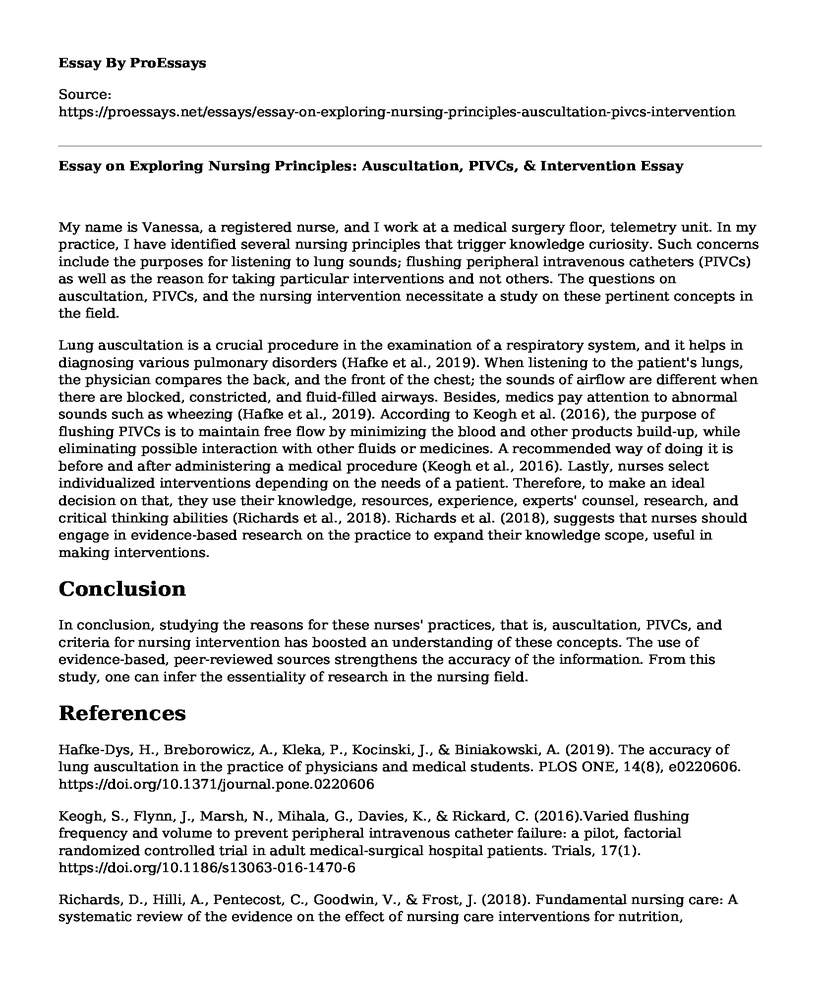My name is Vanessa, a registered nurse, and I work at a medical surgery floor, telemetry unit. In my practice, I have identified several nursing principles that trigger knowledge curiosity. Such concerns include the purposes for listening to lung sounds; flushing peripheral intravenous catheters (PIVCs) as well as the reason for taking particular interventions and not others. The questions on auscultation, PIVCs, and the nursing intervention necessitate a study on these pertinent concepts in the field.
Lung auscultation is a crucial procedure in the examination of a respiratory system, and it helps in diagnosing various pulmonary disorders (Hafke et al., 2019). When listening to the patient's lungs, the physician compares the back, and the front of the chest; the sounds of airflow are different when there are blocked, constricted, and fluid-filled airways. Besides, medics pay attention to abnormal sounds such as wheezing (Hafke et al., 2019). According to Keogh et al. (2016), the purpose of flushing PIVCs is to maintain free flow by minimizing the blood and other products build-up, while eliminating possible interaction with other fluids or medicines. A recommended way of doing it is before and after administering a medical procedure (Keogh et al., 2016). Lastly, nurses select individualized interventions depending on the needs of a patient. Therefore, to make an ideal decision on that, they use their knowledge, resources, experience, experts' counsel, research, and critical thinking abilities (Richards et al., 2018). Richards et al. (2018), suggests that nurses should engage in evidence-based research on the practice to expand their knowledge scope, useful in making interventions.
Conclusion
In conclusion, studying the reasons for these nurses' practices, that is, auscultation, PIVCs, and criteria for nursing intervention has boosted an understanding of these concepts. The use of evidence-based, peer-reviewed sources strengthens the accuracy of the information. From this study, one can infer the essentiality of research in the nursing field.
References
Hafke-Dys, H., Breborowicz, A., Kleka, P., Kocinski, J., & Biniakowski, A. (2019). The accuracy of lung auscultation in the practice of physicians and medical students. PLOS ONE, 14(8), e0220606. https://doi.org/10.1371/journal.pone.0220606
Keogh, S., Flynn, J., Marsh, N., Mihala, G., Davies, K., & Rickard, C. (2016).Varied flushing frequency and volume to prevent peripheral intravenous catheter failure: a pilot, factorial randomized controlled trial in adult medical-surgical hospital patients. Trials, 17(1). https://doi.org/10.1186/s13063-016-1470-6
Richards, D., Hilli, A., Pentecost, C., Goodwin, V., & Frost, J. (2018). Fundamental nursing care: A systematic review of the evidence on the effect of nursing care interventions for nutrition, elimination, mobility, and hygiene. Journal Of Clinical Nursing, 27(11-12), 2179-2188. https://doi.org/10.1111/jocn.14150
Cite this page
Essay on Exploring Nursing Principles: Auscultation, PIVCs, & Intervention. (2023, Apr 24). Retrieved from https://proessays.net/essays/essay-on-exploring-nursing-principles-auscultation-pivcs-intervention
If you are the original author of this essay and no longer wish to have it published on the ProEssays website, please click below to request its removal:
- Research Paper on Incivility in Nursing
- Reengineering Health Care Essay
- A Case Study on Biomedical Ethics in the Christian Narrative Paper Example
- Essay Example on Aged People Denied Long-Term Care Insurance Benefits
- Tackling Obesity With New Dietary Concepts: Atkins, South Beach, Mediterranean & Paleo - Essay Sample
- Modern Hospitals: Complexity & Cost of High Quality Care - Essay Sample
- Report Example on Psychological Malpractice in Australia







